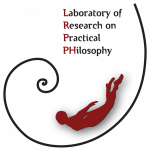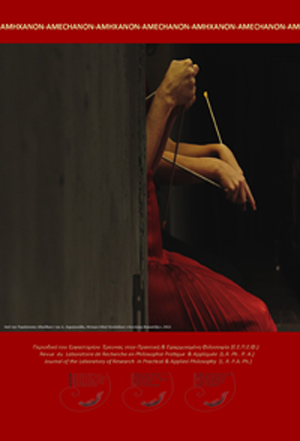
AMECHANON
International Journal of the Laboratory of Research on Practical Philosophy
ISSN: 2459-2846


International Journal of the Laboratory of Research on Practical Philosophy
ISSN: 2459-2846


Orientation
Clarify, recognize, question, reopen the places, ways, forms, withdrawals, recitations, incarnationσ, transmutations, twists of the apparition and development of practical philosophy, its singular cartography and kinesiology within various interdisciplinary and intercultural spatio-temporals. The philosophical understandings and deconstructions of the concept of praxis, of its appearances, movements, voices within multiple forms of life and thinking.
Content
The International Journal of the Laboratory of Research on Practical Philosophy (L.R.P.Ph.) Amechanon is biennial single blind and collaborative peer reviewed Journal whose the main focus is the research on practical philosophy.
The sections of the Journal contain:
Separated sections are also included per volume with:

Editor & Scientific Responsibility
(Directress of the L.R.P.Ph., University of the Aegean)
Articles formatting
Issue 1
Eugenia Patta (PhDc, Univ/ty of the Aegean)
Katerina Renti (PhDc, Univ/ty of the Aegean)
Issue 2
Sotirios Bardas (MEd., Univ/ty of the Aegean)
Eleni Chronopoulou (PhDc, Univ/ty of the Aegean)
Elena Nikolakopoulou (PhDc, Univ/ty of the Aegean)
Eugenia Patta
Issue 3
Eleni Chronopoulou
Elena Nikolakopoulou
Eugenia Patta
Reviewing Committee:
Dr. Caroline Blanvillain, MCF (University of Montpellier, France)

Call for Articles Submission in the Thematic Dossier of the 4rth Issue (2022-2024)
The subject of the thematic dossier to be included in the International Journal AMECHANON of the Laboratory of Research on Practical Philosophy (L.R.P.Ph.), is as follows:
Literature & Practical Philosophy
Manuscripts should be submitted until July 30, 2025.
For abstracts’ submitting, please press HERE
For the References Recording System & General Guidelines, click here
For additional information, contact us, at: lab-prapl-ph@aegean.gr
PERSONAL DATA PROTECTION POLICY
The EU General Data Protection Regulation (GDPR – EU 2016/679) came into full force on 25 May 2018. In this context, we would like to inform you that we have made adjustments to the terms governing the article submission process in Journal Amechanon. The main changes concern the Protection of Personal Data in order to meet the requirements of the EU Data Protection Regulation.
When submitting articles in Journal Amechanon personal data (hereinafter personal data) of the authors are collected, maintained and processed.
The exact personal data collected and processed are limited to what is required for the article review process and contact with the author. These data, which are not communicated or disclosed to third parties can be viewed in detail at LinkedIn here
The collection and processing of personal data is exclusively conducted for the following purposes:
2.1 Submission and evaluation of articles
Submission and evaluation of articles according of the publishes policy of the magazine
2.2. Processing necessary in order to safeguard the legitimate interest of those who submit an article to judgement
The data submitted by the author through the article submission request will be retained and processed to the extent necessary to establish, exercise or support their legal claims.
Applications from authors whose articles have not been admitted are deleted and destroyed after one (1) academic year.
Applications by authors whose articles have been admitted are kept indefinitely.
The University of the Aegean guarantees the rights of authors regarding processing of their personal data and makes it easier for them to exercise their rights.
Candidates have the right to request:
Please note that in cases when authors believe that their privacy rights are being violated, they have the right to contact the Data Processing Officer of the University of the Aegean (dpo@aegean.gr).
It is recalled that the competent authority for the Country is the Personal Data Protection Authority (www.dpa.gr, phone number [+30] 210.6475.600).
Copyright 2019 – Laboratory of Research on Practical Philosophy (L.R.P.Ph.), University of the Aegean.
Copyright 2019 – Laboratory of Research on Practical Philosophy (L.R.P.Ph.), University of the Aegean.
Copyright 2019 – Laboratory of Research on Practical Philosophy (L.R.P.Ph.), University of the Aegean.